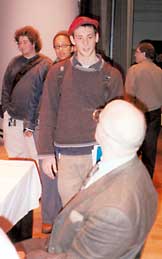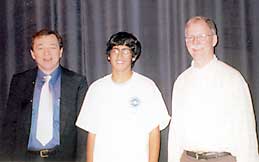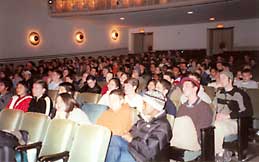
Paul Sally Gives 2003 Arnold Ross Lecture
| | 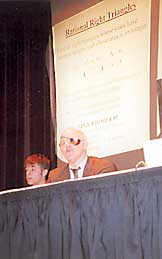 |
Paul J. Sally, Jr. (University of Chicago) gave this year's Arnold Ross Lecture at the Museum of Science and Industry in Chicago. The morning began with AMS Executive Director John Ewing introducing Paul Sally by listing his outstanding achievements and awards. Ewing especially noted Sally's contribution to the the Arnold Ross Lectures and his work with young mathematicians. Sally then began his talk by encouraging any of the nearly 300 students in the audience to come to him whenever they felt like talking about mathematics. The Pythagorean Theorem served as the foundation of his lecture, titled Problems in Mathematics from Zero to Infinity. Sally noted that the Pythagorean Theorem is not a2 + b2 = c2 and emphasized the need for precision when talking about mathematics. He then discussed generalizations of the Theorem (for certain tetrahedra, for example), Pythagorean triples, and points on the unit circle with rational coordinates. This led to right triangles that have rational-length sides and integral areas. Integers that can be the areas of right triangles with rational sides are called congruent numbers. The final portion of the lecture dealt with how congruent numbers lead to elliptic curves and the open question as to which integers are congruent numbers.
In the lively question-and-answer session following the talk, one student asked Sally what was the hardest problem he had ever worked on. Sally responded that he started a problem in 1969 and is still working on it. Members of the audience were quite surprised that a problem could take so long. Sally later pointed out that to do mathematics requires "chipping away" at problems and getting over the idea that answers can be found "in the book in a black box."
After the lecture half a dozen eager students (a congruent number of students) stayed to meet Sally and ask more questions, while many other students were heard animatedly discussing points of the talk over refreshments.Who Wants To Be A Mathematician followed the lecture. The contestants were eleven students who scored best on a qualifying test mailed to Chicago-area schools. Among the questions in the game were two that (coincidentally) dealt with points raised in Sally's talk. Also, one of the contestant's teachers, Paul Karafiol (Walter Payton College Preparatory High School in Chicago) had been a student of Sally's and a participant in an Arnold Ross program for young scholars.
| | 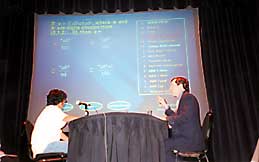 |
The following students participated in the game. (Time allowed for four rounds of play by individual contestants, who were chosen at random. The remaining contestants played the final, shorter, round simultaneously.)
Round 1: Yuka Asano (Glenbrook North High School in Northbrook, Illinois)
Round 2: Andrew Uzzell (Evanston Township, Evanston, Illinois)
Round 3: Manfred Byrd (Evanston Township)
Round 4: Abhi Gulati, $2000 GRAND PRIZE WINNER (Illinois Mathematics and Science Academy, Aurora, Illinois)
Final Round: Jeffrey Chang and Sarah Cheng (Illinois Mathematics and Science Academy); Andrew Glazer and Andrew Costello$1,000 Grand Prize Winners (Glenbrook North High School, Northbrook, Illinois); Pir Stinchcombe (Evanston Township); Gavin Dow (Walter Payton College Preparatory High School, Chicago); and Pamela Pelizzari (Lyons Township High School, Western Springs, Illinois).
| | Audience members supported not only their classmates--for example, "We love you, Pam!" was chanted by students from Lyons Township--but also contestants from other schools--the Lyons students also shouted "We love you, Jeffrey!" to Jeffrey Chang. Abhi Gulati, a junior at Illinois Mathematics and Science Academy, used his lifelines well, cleverly glancing in the direction of the row of teachers when he asked the audience, and then proceeding further in the round to win the $2,000 Grand Prize donated by the AMS.
|
All contestants won prizes ranging from AMS and MAA t-shirts and books, to calculus books from John Wiley and Sons, Texas Instruments graphing calculators, Maple 9 and cash. The AMS thanks all the mathematics students and their teachers who came to the Arnold Ross Lecture and who participated in the game.
The Arnold Ross Lectures are sponsored by the AMS and are held in science museums across the country. The 2004 Arnold Ross lecture will be held at the St. Louis Science Center on April 21. Read about the 2002 Arnold Ross Lectureand Who Wants To Be A Mathematician games.


